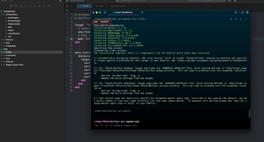In today's interconnected world, video chat
applications have become a cornerstone of digital communication, fostering
connections and bridging distances. Among the myriad of platforms, Omegle
stands out for its spontaneous and anonymous video chat experience. If you've
ever wondered how to create your own video chat app like omegle,
look no further. With Tencent Real-Time Communication (RTC) SDK, you can embark
on the journey of building your own engaging and interactive video chat
platform.
Understanding
Tencent RTC SDK
Tencent RTC SDK is a robust and versatile
toolkit that empowers developers to integrate real-time audio and video
communication capabilities into their applications. With comprehensive features
and flexible customization options, Tencent RTC SDK provides the foundation for
creating immersive and seamless video chat experiences.
Steps to Create
Your Omegle-Like Video Chat App
1. Familiarize
Yourself with Tencent RTC SDK:
Begin by exploring the features and
documentation provided by Tencent RTC SDK. Gain an understanding of the SDK's
capabilities, including audio and video calling, screen sharing, interactive
live streaming, and more. Familiarize yourself with the SDK's APIs, sample
code, and developer resources to facilitate the development process.
2. Design Your
User Interface:
Craft a user-friendly and intuitive
interface for your video chat app. Consider elements such as user registration,
profile creation, search and discovery features, and chat room management.
Design an interface that prioritizes simplicity, aesthetics, and functionality,
ensuring a seamless user experience for your app's participants.
3. Implement
Audio and Video Calling Features:
Utilize Tencent RTC SDK's audio and video
calling capabilities to enable real-time communication between users. Integrate
features such as one-to-one and group video calls, mute/unmute functionality,
camera switching, and screen sharing to enhance the versatility of your video
chat app. Implement codecs and protocols supported by Tencent RTC SDK to ensure
optimal audio and video quality during calls.

4. Ensure
Security and Privacy:
Prioritize the security and privacy of your
users' data and communications. Implement end-to-end encryption, authentication
mechanisms, and access controls to safeguard sensitive information and prevent
unauthorized access. Comply with data protection regulations and industry best
practices to build trust and confidence among your app's user base.
5. Optimize for
Performance and Scalability:
Optimize your video chat app for
performance, scalability, and reliability. Leverage Tencent RTC SDK's
infrastructure and cloud-based solutions to handle varying traffic loads,
minimize latency, and ensure high availability. Implement monitoring and analytics
tools to track app performance metrics and identify areas for improvement.
6. Test and
Iterate:
Conduct thorough testing and debugging
throughout the development process. Test your video chat app across different
devices, operating systems, and network conditions to ensure compatibility and
responsiveness. Solicit feedback from beta testers and early adopters to
identify usability issues, bugs, and feature requests. Iterate and refine your
app based on user feedback and testing results to deliver a polished and
refined user experience.
Conclusion
In conclusion, leveraging Tencent RTC SDK
provides developers with the tools and capabilities to create their own
Omegle-like video chat app. By following the steps outlined above and
harnessing the power of Tencent RTC SDK, you can embark on a journey of
innovation and creativity in the realm of real-time communication. Whether
connecting friends, facilitating virtual events, or fostering global
connections, your video chat app has the potential to redefine the way people
interact and communicate in the digital age. Embrace the possibilities, unleash
your creativity, and embark on the exciting journey of building your own video
chat platform with Tencent RTC SDK.



